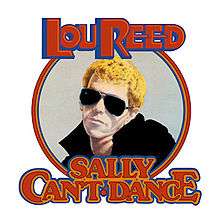Sally Can't Dance
| Sally Can't Dance | ||||
|---|---|---|---|---|
 | ||||
| Studio album by Lou Reed | ||||
| Released | August 1974 | |||
| Recorded | 18 March – 26 April 1974 | |||
| Studio | Electric Lady Studios, Greenwich Village, New York City[1] | |||
| Genre | ||||
| Length | 32:58 | |||
| Label | RCA | |||
| Producer |
| |||
| Lou Reed chronology | ||||
| ||||
| Professional ratings | |
|---|---|
| Review scores | |
| Source | Rating |
| AllMusic | |
| Chicago Tribune | |
| Robert Christgau | B+ [4] |
Sally Can't Dance is the fourth solo studio album by American musician Lou Reed, released in August 1974 by RCA Records. Steve Katz and Reed produced the album. It remains Reed's highest-charting album in the United States, having peaked at #10 during a 14-week stay on the Billboard 200 album chart in October 1974.[5] It is also the first solo Lou Reed album not to feature any songs originally recorded by Reed's earlier band, the Velvet Underground, as well as the first of Reed's solo studio albums to be recorded in the United States (Reed's previous three albums were all recorded in the United Kingdom).
Background
Aside from the title song, Sally Can't Dance includes "N.Y. Stars" (in which Reed pokes fun at "fourth-rate imitators" who tried to impress him by copying his style), "Kill Your Sons" (a reflection of his stay in a psychiatric hospital at his parents' insistence, during his teen years), and "Billy," about the fate of a schoolmate with more "normal" ambitions than he'd had. The latter track reunited Reed with erstwhile Velvet Underground bandmate Doug Yule, playing bass guitar. More tracks featuring Yule have emerged on a CD re-issue. The album's tour featured Danny Weis, on guitar; Michael Fonfara, on keyboards; Prakash John, on bass and Pentti "Whitey" Glan, on drums on the European leg. Eric "Mouse" Johnson played drums on the Australian and U.S. sections. The sound engineer for all the live shows was Robin Mayhew, who had previously worked with David Bowie during his Ziggy Stardust period.
While the record was a hit and elevated Reed's status as a star, he reportedly was disappointed in its production (in which he took a largely passive role) and the treatment of the songs. Reed remarked, "It seems like the less I'm involved with a record, the bigger a hit it becomes. If I weren't on the record at all next time around, it might go to Number One."
His record label, RCA, insisted on a rapid follow-up album while his career appeared to be peaking. Tiring of the pressure put on him, and with his contract requiring RCA to release whatever record he gave them, Reed handed over the master tape of Metal Machine Music—an hour of feedback and noise, with no hope of becoming a hit.
Track listing
All tracks written by Lou Reed.
| Side one | ||
|---|---|---|
| No. | Title | Length |
| 1. | "Ride Sally Ride" | 4:06 |
| 2. | "Animal Language" | 3:05 |
| 3. | "Baby Face" | 5:06 |
| 4. | "N.Y. Stars" | 4:02 |
| Side two | ||
|---|---|---|
| No. | Title | Length |
| 5. | "Kill Your Sons" | 3:40 |
| 6. | "Ennui" | 3:43 |
| 7. | "Sally Can't Dance" | 4:12 |
| 8. | "Billy" | 5:10 |
| Total length: | 32:58 | |
| Bonus tracks | ||
|---|---|---|
| No. | Title | Length |
| 9. | "Good Taste" | 3:30 |
| 10. | "Sally Can't Dance" (Single Version) | 2:56 |
Personnel
Credits are adapted from the Sally Can't Dance liner notes.[6]
- Lou Reed – vocals; acoustic guitar on "Billy"
- Danny Weis – guitar; tambourine; backing vocals; horn arrangement
- Paul Fleisher – saxophone on "Billy"
- David Taylor, Lou Marini, Trevor Koehler, Jon Faddis, Alan Rubin, Alex Foster, Lew Soloff – horns
- Steve Katz – harmonica; horn arrangement
- Michael Fonfara – piano; keyboards; Mellotron on "Ennui"
- Prakash John – bass guitar; backing vocals
- Doug Yule – bass guitar on "Billy"
- Ritchie Dharma – drums on "Kill Your Sons" and "Ennui"
- Pentti "Whitey" Glan – drums
- Doug Bartenfeld – guitar
- Michael Wendroff – backing vocals
- Joanne Vent – backing vocals
- Horn arrangements: Lew Soloff and Martin Sheller
Production
- Steve Katz – producer
- Lou Reed – producer
- Mike Stone – recording engineer
- Ralph Moss – remix engineer
- Dennis Katz – cover concept
- Acy Lehman – art direction
- David Byrd – artwork
- Mick Rock – front cover illustration
Chart performance
| Chart | Peak position |
|---|---|
| US Billboard 200[7] | 10 |
See also
References
- ↑ Discogs - Sally Can't Dance 2001-02-20th US reMastered release
- ↑ Deming, Mark. Sally Can't Dance at AllMusic. Retrieved 2011-09-02.
- ↑ Kot, Greg (January 12, 1992). "Lou Reed's Recordings: 25 Years Of Path-breaking Music". Chicago Tribune. Retrieved July 29, 2013.
- ↑ "(retrieved 16th June 2011)". robertchristgau.com. Retrieved 2011-09-02.
- ↑ http://www.billboard.com/artist/308261/lou-reed/chart?f=305
- ↑ Sally Can't Dance (CD booklet). Lou Reed. RCA Records. 1974.
- ↑ "Lou Reed > Charts & Awards > Billboard Albums". AllMusic. All Media Network. Retrieved 2010-09-02.
External links
- Sally Can't Dance at Discogs (list of releases)